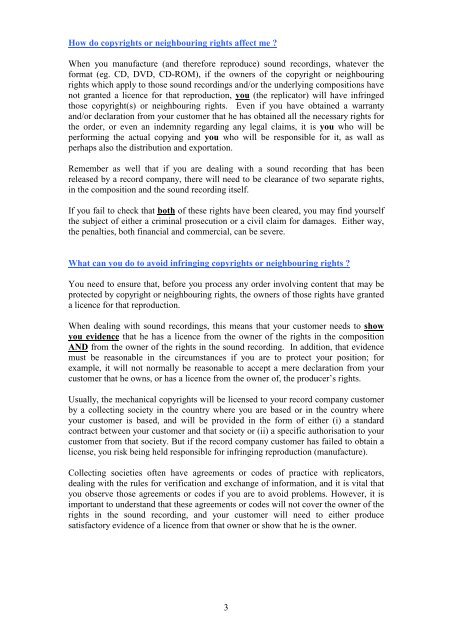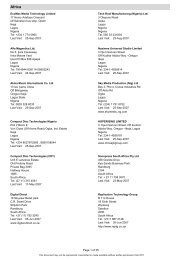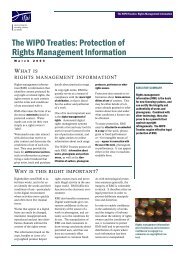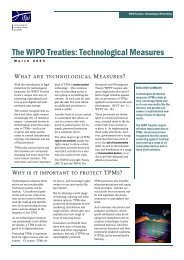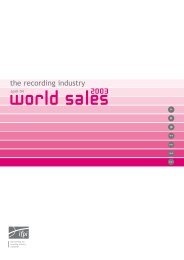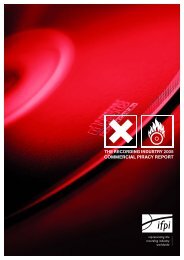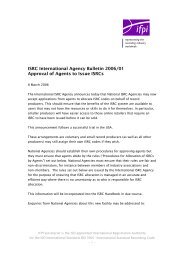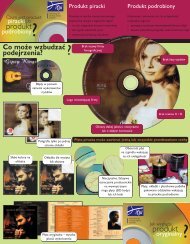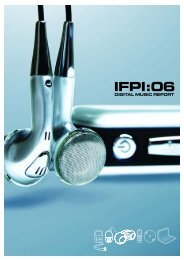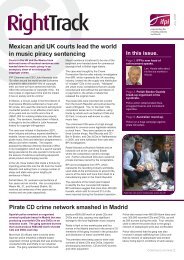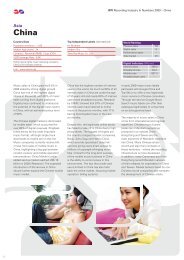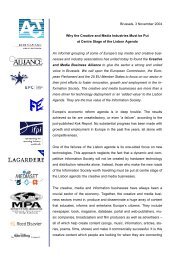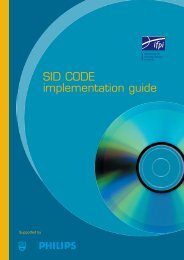Copyright For Replicators - How To Protect Your Business - IFPI
Copyright For Replicators - How To Protect Your Business - IFPI
Copyright For Replicators - How To Protect Your Business - IFPI
You also want an ePaper? Increase the reach of your titles
YUMPU automatically turns print PDFs into web optimized ePapers that Google loves.
<strong>How</strong> do copyrights or neighbouring rights affect me ?<br />
When you manufacture (and therefore reproduce) sound recordings, whatever the<br />
format (eg. CD, DVD, CD-ROM), if the owners of the copyright or neighbouring<br />
rights which apply to those sound recordings and/or the underlying compositions have<br />
not granted a licence for that reproduction, you (the replicator) will have infringed<br />
those copyright(s) or neighbouring rights. Even if you have obtained a warranty<br />
and/or declaration from your customer that he has obtained all the necessary rights for<br />
the order, or even an indemnity regarding any legal claims, it is you who will be<br />
performing the actual copying and you who will be responsible for it, as wall as<br />
perhaps also the distribution and exportation.<br />
Remember as well that if you are dealing with a sound recording that has been<br />
released by a record company, there will need to be clearance of two separate rights,<br />
in the composition and the sound recording itself.<br />
If you fail to check that both of these rights have been cleared, you may find yourself<br />
the subject of either a criminal prosecution or a civil claim for damages. Either way,<br />
the penalties, both financial and commercial, can be severe.<br />
What can you do to avoid infringing copyrights or neighbouring rights ?<br />
You need to ensure that, before you process any order involving content that may be<br />
protected by copyright or neighbouring rights, the owners of those rights have granted<br />
a licence for that reproduction.<br />
When dealing with sound recordings, this means that your customer needs to show<br />
you evidence that he has a licence from the owner of the rights in the composition<br />
AND from the owner of the rights in the sound recording. In addition, that evidence<br />
must be reasonable in the circumstances if you are to protect your position; for<br />
example, it will not normally be reasonable to accept a mere declaration from your<br />
customer that he owns, or has a licence from the owner of, the producer’s rights.<br />
Usually, the mechanical copyrights will be licensed to your record company customer<br />
by a collecting society in the country where you are based or in the country where<br />
your customer is based, and will be provided in the form of either (i) a standard<br />
contract between your customer and that society or (ii) a specific authorisation to your<br />
customer from that society. But if the record company customer has failed to obtain a<br />
license, you risk being held responsible for infringing reproduction (manufacture).<br />
Collecting societies often have agreements or codes of practice with replicators,<br />
dealing with the rules for verification and exchange of information, and it is vital that<br />
you observe those agreements or codes if you are to avoid problems. <strong>How</strong>ever, it is<br />
important to understand that these agreements or codes will not cover the owner of the<br />
rights in the sound recording, and your customer will need to either produce<br />
satisfactory evidence of a licence from that owner or show that he is the owner.<br />
3


